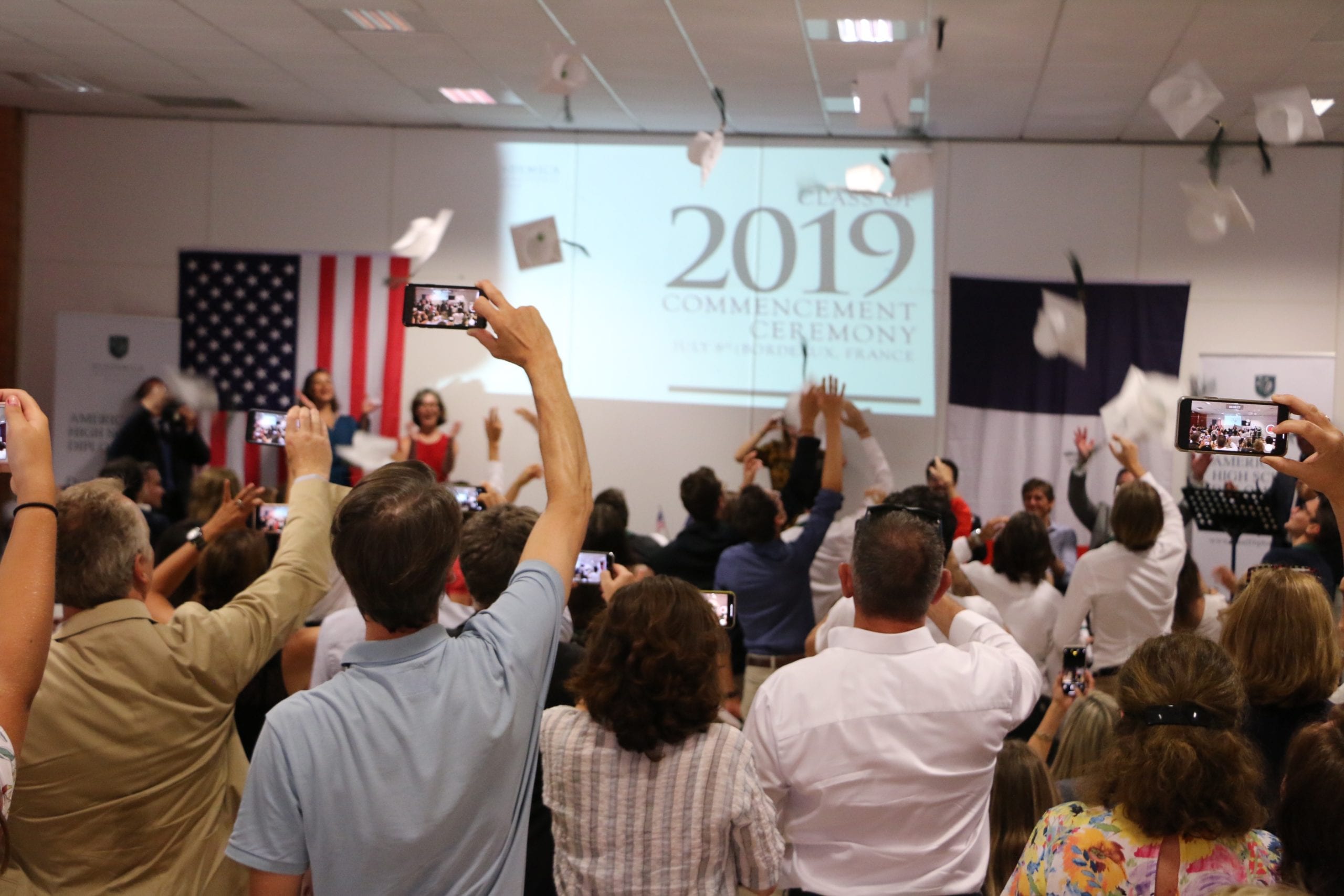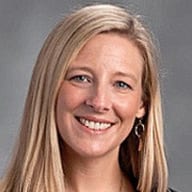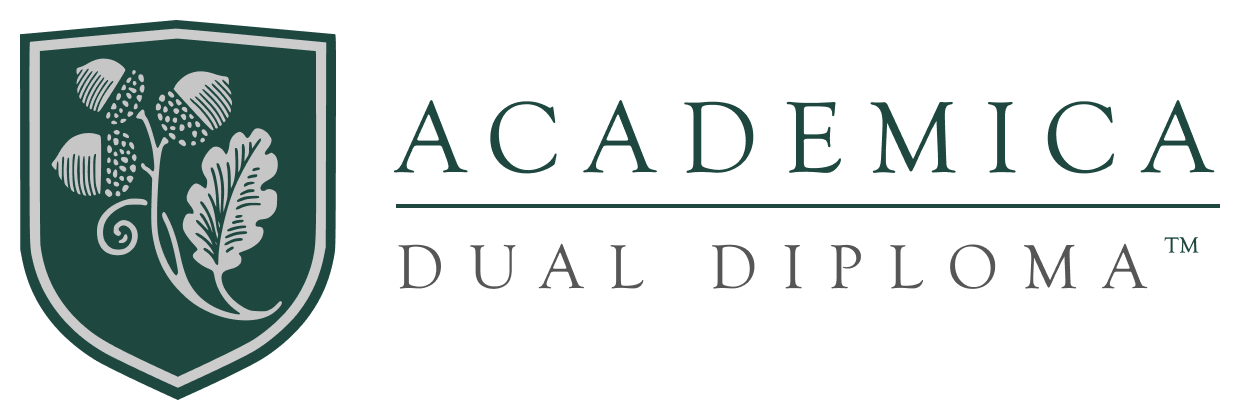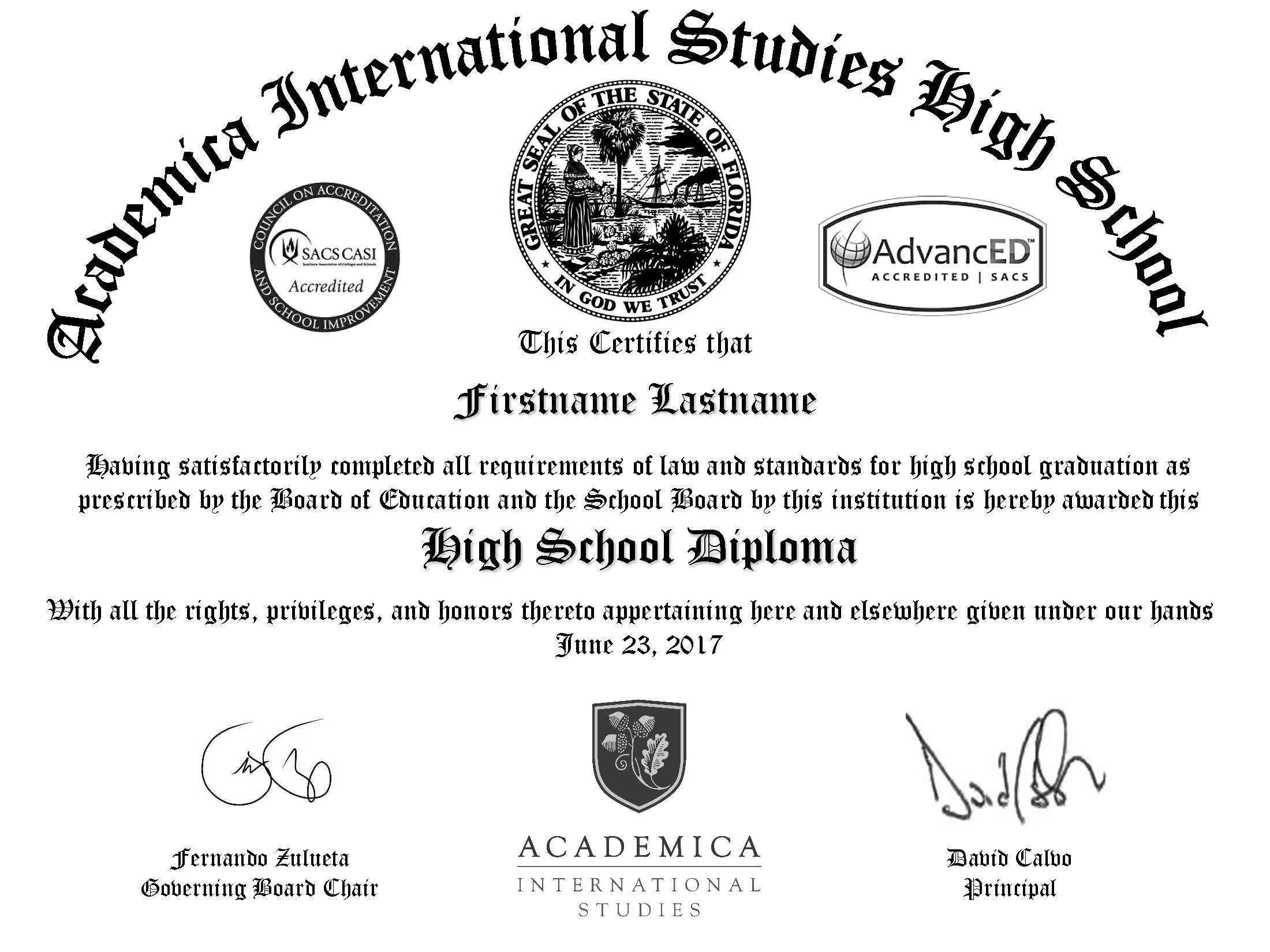Study like in the USA
What, for whom, how?
The Dual Diploma is the French Baccalauréat + a digital American High School Diploma: 2 distinct diplomas verified by their respective authorities, the French Ministry of Education and Florida’s department of education in the United-States.
The student studies in 2 schools simultaneously, in a classroom in their French school and in an American High School based in Florida through online immersion. Thanks to binational agreements concluded by Academica, first American charter schools group, the report cards from the French Education allow to validate 18 of the 24 High School Diploma credits.
The student validates, online, the 6 additional credits with Academica International Studies (AIS). At the end of this innovative program, accompanied by our American teachers, they receive the same diploma as an American student would at the end of High School.
For students starting from the 9th grade (Troisième), either in our partnering schools, or as an individual student in France or as an expatriate.
For students with a basic (English 1), advanced (English 2), or fluent (English 3) level in english. The entry level is determined during the admissions test. Our program is personalized according to the student’s level in english.
The student studies at their speed, on their computer, for 2 to 5 hours per week depending on their level. Academica makes all necessary educational documents and tools available to the student. On their personal platform, they check their courses, study and send their homework directly online. The curriculum is personalized according to the english level: Differentiated Instruction allows the teaching to be adapted to the level and potential of each student. Classes are exclusively in english with native speakers.
|
The student exchanges online using e-mail or skype with their American teacher who monitors them all year round. At the start of the semester, they receive the syllabus with important dates: classes in Live Sessions or One on One; homework to be handed in for grading. Students with English 1 or English 2 levels have additional work based on orality: comprehension, pronunciation, accent. Students, who are already bilingual (level 3), study literature, and write articles and presentations. Homework is to be handed in on average every 10 days. It varies for each student, depending on their progress in the program. |
Live Sessions take place every two weeks between 6PM and 9PM for an hour using videoconference and count for the final grade. Twenty or so student of various nationalities and their teacher gather around a previously studied theme (flipped classroom style learning). Subjects like Artificial Intelligence, Fake News and Elections are debated on, engaging students, developing their critical thinking and confronting their ideas in a multicultural setting. Teachers guide the student’s progress step by step all along this path of excellence. They are available every day between 4:30PM and 9PM, via e-mail or Skype, to discuss with them on the content of a class or an assignment to be handed in. Our students appreciate their benevolence, responsiveness and attention, as well as their always positive ‘extended hand’ policy. Parents can at any point in time ask for a meeting with the American teacher. |
L’élève échange en ligne avec son Professeur Principal américain. En début de semestre, il reçoit l’agenda avec les dates importantes : cours présentiels en Live sessions ou One on One ; devoirs à rendre en contrôle continu.
L’élève de niveau Anglais I ou 2 effectue un travail supplémentaire basé sur l’oralité : compréhension, prononciation, accent. L’élève déjà bilingue étudie la littérature, rédige articles et exposés. Les devoirs sont à rendre en moyenne tous les 10 jours. Ils varient pour chaque élève, selon son avancée dans le programme.
Les Live Sessions ont lieu tous les 15 jours entre 18h et 21h en visioconférence et comptent pour le contrôle continu. Une vingtaine d’élèves de toutes nationalités se retrouvent avec le professeur autour d’un thème travaillé en amont (Pédagogie Inversée). Sont débattus des sujets tels l’Intelligence Artificielle, les Fake News, les Elections, engageant l’élève à développer sa pensée critique et à confronter ses idées dans un cadre multiculturel.
Les enseignants guident pas à pas les progrès de l’élève tout au long de ce parcours d’excellence. Ils sont disponibles tous les jours entre 16h30 et 21h, par mail ou Skype, pour échanger avec eux sur le contenu d’un cours, un devoir à rendre ou autre. Nos élèves apprécient leur bienveillance, réactivité et écoute, ainsi que leur ‘main tendue’ toujours positive. Les parents peuvent à tout moment demander un rendez-vous au professeur Américain.
Enrolment is available until July 21th 2024.
Student at a partnering school : connect with a school director or the Dual Diploma Program Director.
Individual student : all information can be found on the Individual Students tab.
Success on the test validates admission. Taken by students from around the world mid-September, this test evaluates the English level, knowledge in grammar, vocabulary and reading comprehension, and places the students in the correct level. The student receives their acceptance letter by mail within 15 days.
2024 Admissions Test
| When? | Between September 16th and 19th 2024 |
| Where? | In the partnering school or as an external candidate |
| Quoi ? | Online, MCQ – 60 questions – 75 minutes |
| Niveau? | Between E1 and E2 of the Common European Framework of Reference (CECR) |
Benefits
Biculture and immersion in an American High School
Courses and communication 100% in english with American teachers; broadening of horizons: the student learns in a multicultural environment; access to clubs: debate, journalism, photography, social media with American students in their High School.
Learning of new technologies
Free-flowing teacher/student communication using e-mail, the online dashboard, messages, videoconferences.
Flipped classroom style learning – differentiated instruction
Teaching staff responsiveness
Each student has a American head teacher with whom they will have regular check-ups (every 15 days on average). The teacher is available everyday from 4:30PM to 9PM via e-mail, WhatsApp or Skype upon appointment.
Strength of character
Availability and benevolence of the teachers in the US; ‘extended hand’ policy
Gain of a high level of autonomy, responsibility, adaptability and maturity in their schoolwork
Asset for the academic record
Enhancement of the student’s profile for higher education in France or abroad; College Counselling for students who want to study in the US.
Study plan
With Academica International Studies (AIS), the student obtains 6 credits: they enter the program in the 9th (Troisième) or 10th (Seconde) grade. Within these 6 credits, 4 are mandatory: Core Credits, and 2 are electives.
The 4 Core Credits include 2 English credits (I, II or III depending on results at the admissions test), 1 US History credit, 1 US Government/Economy credit.
The 2 Elective Credits are for the student to choose according to their preferences and interests:
|
|
* Certain credits have a prerequisite. College Prep prepares the entrance exams for American Universities (SAT or ACT) and requires English III.
Student’s study plan according to their starting year in the program:
In 4 years |
In 3 years |
In 2 years |
|
9th Grade (Troisième) |
English | ||
10th Grade (Seconde) |
English + Elective | English + Elective | |
11th Grade (Première) |
American History + Elective | English + American History | English + American History + Elective |
12th Grade (Terminale) |
US Government – Economy | US Government – Economy + Elective |
English + US Government – Economy + Elective |
Syllabus
Academia International Studies guarantees to their student:
| ACCESS
Access to an extremely diverse, fully-accredited course catalog. Our courses are aligned to both state and national standards. |
INNOVATION
The possibility for student enrichment in a rich and engaging virtual classroom provided by a student-friendly Learning Management System (LMS). The LMS also gives teachers flexibility to enhance course content and adapt requirements and objectives to directly meet individual student needs when needed. |
| RESPONSIVENESS
Facilitation and feedback will be provided by highly experienced faculty members, who hold valid Florida teaching certificates. Our teachers are professionally trained in online education best practices, and will communicate and collaborate with students adhering to our high standards for faculty responsiveness. |
MENTORSHIP
Students will be closely monitored by teachers and administrators to ensure achievement and success, including a cohesive communications plan that alerts students and parents about progress and pacing so any potential problems or struggles are solved before they become major issues. |
Description of the studied courses in the Dual Diploma Program
In this class you are going to participate in a series of online tutorials, state-of-the-art learning modules, oral and written examinations, and creative projects. You will become more knowledgeable about everyday English vocabulary and grammar and highly proficient in practical conversation and day-to-day interaction. You will acquire a variety of skills related to both comprehension and communication in everyday English. Prerequisites: None. Credits 1.0. Major Concepts Covered:
In this class you will continue to participate in a series of online tutorials, state-of-the-art learning modules, oral and written examinations, and creative projects. You will continue to improve your English vocabulary and grammar skills as well as become proficient in more formal settings. Prerequisites: Successful completion of English I or the equivalent. Credits 1.0 Major Concepts Covered: The purpose of this course is to give students the tools to understand and express who they are and where they want to go. By the end of the course, each student’s portfolio of writings will provide a descriptive self-portrait of a young adult growing up. Prerequisites: Successful completion of English II or the equivalent. Credits 1.0 Major Concepts Covered: The purpose of this course is to provide students integrated English language arts study in reading, writing, speaking, listening, and language for college and career preparation and readiness. Prerequisites: Successful completion of English III. Credits 1.0. Major Concepts Covered: The purpose of this course is for students to discover how real life is the foundation of the best stories, plays, poems, films, and articles. Students will explore a variety of human experiences such as laughter, obstacles, betrayal, fear, and transformation through the study of literature and writing. Prerequisites: Successful completion of English IV . Credits 1.0 Major Concepts Covered:English I
Semester 1
Semester 2
English II
Semester 1
Semester 2
English III
Semester 1
Semester 2
English IV
Semester 1
Semester 2
English V
Semester 1
Semester 2
In this course, you will recognize examples of economics in your daily life. You will see how the economic choices of larger groups, like businesses and governments, affect you and others. Prerequisites: Successful completion of English I or the equivalent and United States Government. Credits .5 Major Concepts Covered: You will gain a greater understanding on the history of the United States of America’s beginnings, and knowledge of how government functions at the local, state and national levels. Prerequisites: Successful completion of English I or the equivalent. Credits .5 Major Concepts Covered: In this course, you will look at some of the most profound questions that thoughtful United States still debate. You will research many important events throughout the history of the United States of America. In the process, you will witness the development of the United States throughout its history to today’s superpower status. Prerequisites: None. Credits 1.0 Major Concepts Covered: Semester 1 Semester 2Economy
United-States Governement
United-States History
In this course, you will practise thinking stratefies, build verbal competence, and sharpen your matheatics reasoning. You will acquire essential test-taking strategies. Prerequisites: None. Credits 1.0. Major Concepts Covered: College Entrance Exam vocabulary, requirements and facts; Vocabulary: word meaning, roots, prefixes and suffixes, sentence types, sentence completion, literary termas and transitional words; Critical reading; Inferences; Point of view; Author's tone and attitude; Long and short reading passages; Understanding reading passages and determining main ideas; Web use for self enhancement in vocabulary; Algebraic expressions and mistakes; Changing word problems into math problems; Math - rate, distance, work, cost and mixture problems; Simultanious equations; Factoring quadratics; Inequalities; Binomials and trinomials Direct and inverse variation; Functions; Probability; Rational and Radical Equations; Graphing equations and absolute value; Geometry including: coordinate geometry, Pythagorean theorem, parallel and transversal lines, area and perimeter, triangles, rectangles, polygons and circles surface area; Permutations and combinations: Alphanumeric problems, Logic, Graphs/Charts; Writing Essays: using essay prompts, brainstorming and planning, word choice, elaboration sentence type; Grammar: identifying errors and punctuation. In this course, you’ll be exploring the various fields of this occupation, its history, the important role it plays in human life, and the ethical issues related to engineering. Prerequisites: None. Credits 1.0. Major Concepts Covered: In this course, students will explore the field of criminology or the study of crime. In doing so, students will look at possible explanations for crime from psychological, biological, and sociological standpoints, explore the various types of crime and their consequences for society, and investigate how crime and criminals are handled by the criminal justice system. Prerequisites: None. Credits 1.0 Major. Concepts Covered: In this course, students will learn creative photographic skills and processes. Students will build a portfolio of work and explore the fields of photography and graphic arts. Prerequisites: None. Credits 1.0. Major Concepts Covered: The purpose of this course is to produce health literate students that make sound decisions and take positive actions for healthy and effective living. The course is wellness oriented and emphasizes responsible decision-making and planning for a healthy lifestyle. Prerequisites: None. Credits 1.0. Major Concepts Covered: The purpose of this course is to introduce you to the psychological facts, principles, and phenomena associated with each of the subfields within psychology. Prerequisites: None. Credits 1.0. Major Concepts Covered: In the first semester of this course, students will learn about public speaking. They will learn what makes a great speech or presentation and how to write their own. Students will also learn how to combat stage fright and how to deliver a great speech. In the second semester, students will learn about what journalism is and how to become a good journalist. They will learn about different types of journalism and why journalism is important. Prerequisites: None. Credits 1.0. Major Concepts Covered:College Entrance Exam prep
Concepts of engineering & technology
Criminology
Digital photography
Life management skills
Psychology
Public Speaking and Journalism
Studying time and calendar
Studying time is 2 to 5 hours per week on average, depending on the student’s abilities and the number of courses taken. This time includes individual work and classes. The student must be consistent and connect online each week. The school year is comprised of 2 semesters, school breaks are that of an American student.
First semester :
From October 9th 2023 to February 2th 2024, allows the student to correctly start their French studies ;
Second semester :
From February 12th 2024 to May 31th 2024.
American teachers
Making digital learning more humane is the daily leitmotiv for the pool of American teachers, selected among Academica’s 4500 instructors. At the heart of the program is a highly qualified team that knows of the best practices for traditional, digital, flipped classroom style, differentiated instruction. They constantly find the best digital tools, and create them when non-existent. They liven up the Live Session alternately with debates, role play, serious games, and enable every student to participate, including the shyer ones. Competency, availability and benevolence are qualities common to all. A teacher is assigned to each student for the year.
Grading and criteria for graduation
To pass a semester, the student needs to obtain a minimum of 70% in each course (credit). Continuous monitoring allows the student to know where they are at, to improve by redoing homework, or ask for extra credit work.
If at the end of the first semester the students obtains 65%, they will have to obtain 75% for the second semester to pass that year. Bellow 60%, the student will be let go, considering that they have not given the minimum required effort.
The student must maintain a minimum of a 2.0 Grade Point Average (GPA), equivalent to a minimum average of 70% in all of their courses. To validate the American High School Diploma’s 18 credits, the family provide AIS all official French transcripts from the 8th to 12th grade. An average of 10 on 20 in each course allows credits to be validated.
Graduation
Graduation is in the beginning of July with the presence of officials from the American embassy or consulate, and of Academica’s French and American executive teams.
Photo of the 2019 Graduation in France

Necessary equipment
Computer with a camera, access to internet, earphones.
Prices
Contact a partnering school or Academica France.

Alissa Longo
It is my belief that education can change the world. By providing my students with an engaging and effective learning environment, I am not just teaching them a skill but helping students become lifelong learners“

Heather Simons


